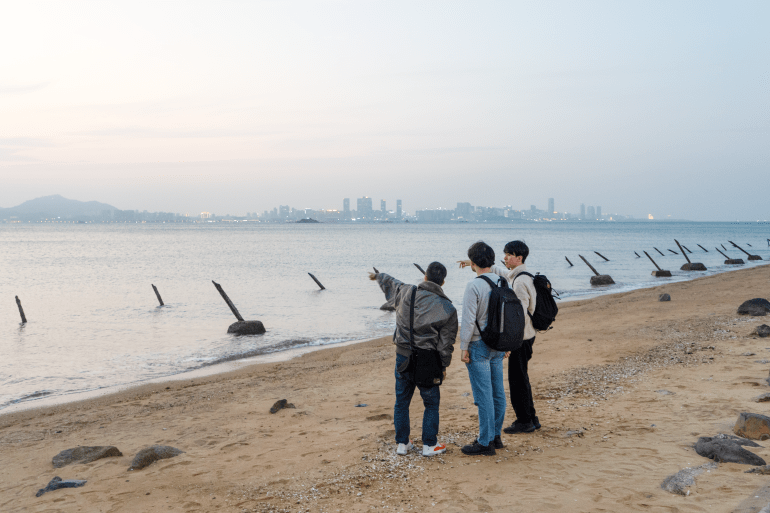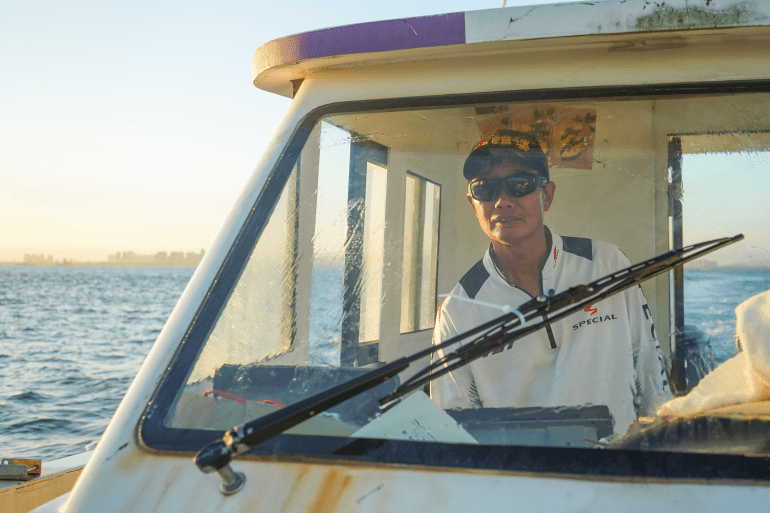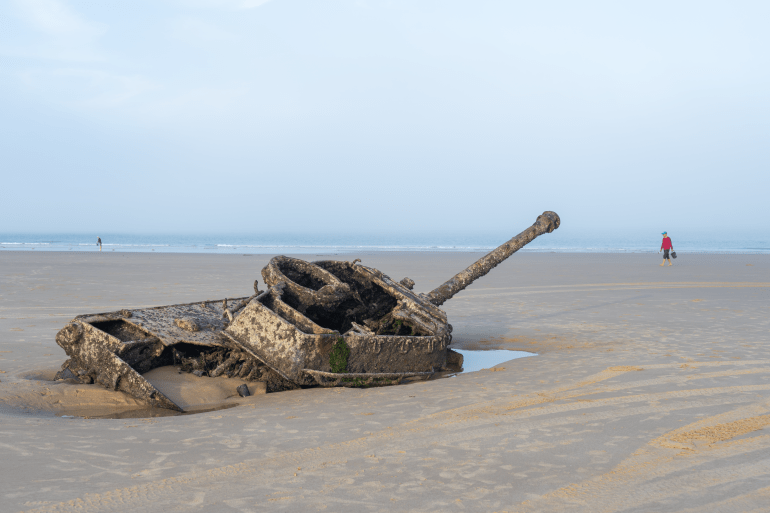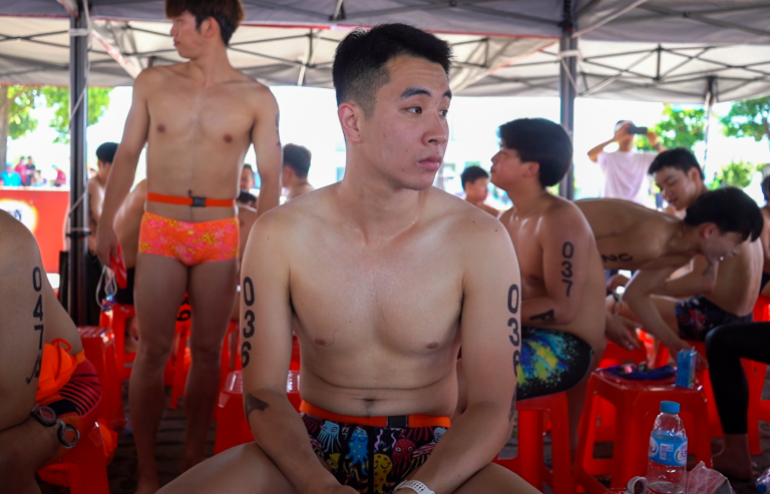Kinmen, Taiwan – On Taiwan’s sandy shores, Liu Xi Jiu puts on his goggles as he prepares to race across one of the most dangerous stretches of water in the world.
Originally from Beijing, he is competing in the only event of its kind, a seven-kilometre (4.3-mile) swimming race across a geopolitical hotspot, from Taiwan’s offshore Kinmen Islands to the city of Xiamen on China’s east coast.
Around him, 200 athletes from China, Taiwan, Hong Kong and Macau laugh and joke as they warm up. In front of them, past the rows of anti-invasion spikes that line Kinmen’s golden beaches, Xiamen’s distinctive skyscrapers glint in the morning sun.
But the warm weather and sense of friendly competition mask the increasingly tense relations across the strait that separates democratic Taiwan from China, which claims the island as its own.
The swimmers, preparing to make the gruelling 90-minute crossing, hope their camaraderie can serve as an example for smoother exchanges across these choppy waters.
Kinmen and its residents have always had a close relationship with China, Wu Zeng Yun, CEO of the Kinmen-Matsu Joint Services Centre, told Al Jazeera.
While Wu’s workplace now serves as the local branch of Taiwan’s central executive, the building still bears the name Fujian Provincial Government. Emblazoned in gold above the imposing entrance, the characters are a reminder of the time when Kinmen was part of China’s Fujian Province.
“In the past, my uncles did business in Tong’an on the mainland,” Wu said, referring to the historic district visible across the waters from just outside his office.

“It was a shared living area,” he added. “You simply went to the pier, boarded a ship to Tong’an, and paid the fare.”
But after the end of the Chinese civil war in 1949, everything changed. Facing defeat at the hands of the Communists, the nationalist Republic of China government fled Beijing and established itself in Taiwan. It also retained control of the Kinmen Islands, more than 300km (186 miles) from Taipei.
The island’s residents were cut off from the province they had once been part of and soon found themselves on the front lines of a political battle between Taipei and Beijing that at times erupted into violence.
With China regularly shelling the island until 1979, residents can remember hiding in the bunkers that dot the island, taking cover as bombs rained down on their villages.
China reaffirmed its willingness to use force to take control of Taiwan, which considers the territory its own, in a white paper as recently as 2022. The government in Taipei says the people of Taiwan should be the ones to decide their future.
Heightened tensions
Standing in Kinmen’s Shuitou Pier Ferry Terminal, Legislator Chen Yu Jen said her father was on board one of the first boats that reconnected Kinmen with China in 2001.
At the time, it was hoped such connections could help improve relations between Taipei and Beijing, but as Chen makes her way to the departure gate, preparing to follow in her father’s footsteps, that hope has yet to materialise.
In mid-February, Kinmen was once again the focus of cross-strait tensions after a clash between the Taiwanese coastguard and a Chinese ship caught fishing in Kinmen’s waters. Two of the fishermen died.
To make matters worse, it was discovered that the Chinese boat had capsized after it collided with the Taiwanese ship, a fact that Taipei had initially omitted from its account of the incident.
In response, the Chinese Coast Guard (CCG), indirectly under the command of Beijing’s Central Military Commission, stepped up its presence in the region.

Looking out across the troubled waters from his small boat, local fisherman and business owner Lu Wen Shiung says the fishing community has already felt the impact.
“When cross-strait relations were less tense, we had good relations with the coastal fishermen from the mainland,” he recalled. “If the mainland fishermen had a good catch, they would share with us.”
But with CCG ships beginning to regularly cross into Kinmen’s territorial waters, a line that was largely respected until February, Lu now faces pressure from Chinese ships even when his boat is motoring closer to Kinmen’s shores.
“The activities of the Chinese Coast Guard have changed significantly. They now frequently patrol our waters,” explained Lu.
In an unprecedented move, the CCG even boarded a Taiwanese tour boat in February. Three months later, it announced a series of military exercises around Kinmen for the first time.
“Whenever we go out to sea, we often encounter them,” fisherman Lu said, referencing the CCG. “This year, I’ve already been chased three times.”
In early July, a Taiwanese fishing boat with two Taiwanese and three Indonesian nationals on board was also seized by the Chinese Coast Guard and taken to the mainland, accused of violating a summer fishing ban. The boat’s captain remains under investigation, but the crew was released this week.
“Some fishermen who work nearby are worried that any misstep could result in their boat being detained,” Kinmen county councillor, Tung Sen Pao, told Al Jazeera.
While analysts say China’s incursions are part of Beijing’s “grey zone” tactics to exert pressure on Taipei, some in Kinmen worry about the potential risk of escalation and accidental conflict.

Recognition and respect for Kinmen’s restricted waters is “crucial for maintaining peace”, said Wu of the Kinmen-Matsu Joint Services Centre. “If the mainland unilaterally denies it, it increases the risk of conflict.”
“If border units, coast guards and coast police clash during their duties … it might lead to unnecessary disputes and accidents, potentially sparking military conflicts, which would be detrimental to both sides,” Councillor Tung said.
Silver linings
Despite the upset caused by the fishermen’s deaths, some are hopeful that Kinmen can once again become a place of cross-strait collaboration, noting a level of “goodwill” between local governments on the island and in Xiamen.
On July 30, Taipei’s Straits Exchange Foundation (SEF), a semi-official organisation tasked with promoting cross-strait cooperation, and their Chinese counterparts finally came to an agreement that would repatriate the bodies of the Chinese fishermen, whose deaths led to the initial rise in tensions in February, back to the mainland.
With the men’s bodies now returned to China, some are hoping tensions will ease.
A former Taiwanese soldier, detained in March after his boat strayed into Chinese waters, was also released this month.
Back on Kinmen’s beach, Chinese swimmer Liu stands shoulder to shoulder with his Taiwanese competitors, facing the Chinese coast.
For him and many of the other Chinese swimmers, the race marks their first time in Taiwan.
Like the organisers of the competition, the swimmers hope that the race serves as an example of what cooperation can achieve, and the diplomatic advances already made.
“This kind of sports event helps foster connections between people,” he said. “I hope the two sides can resolve issues peacefully.”

At the sound of the starting horn, he dives headfirst into the waves, powering through the water on his way to Xiamen.
“In the past, the sea was a battlefield between Kinmen and Xiamen. They fought each other with bullets,” Legislator Chen recalled. When she was growing up, Kinmen’s shores were strictly off-limits, reserved for military purposes.
“Now this sea is a place of peace. People can swim over and swim back,” she said.